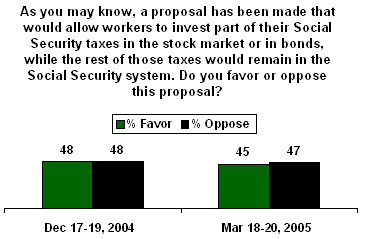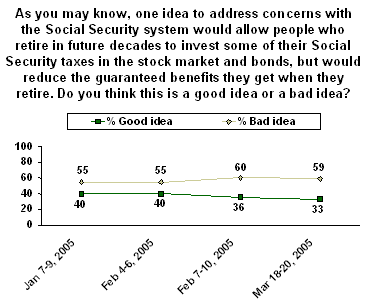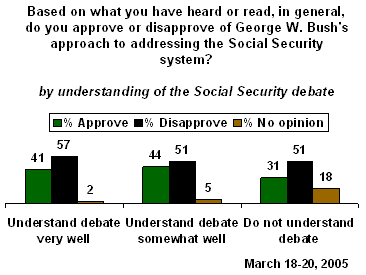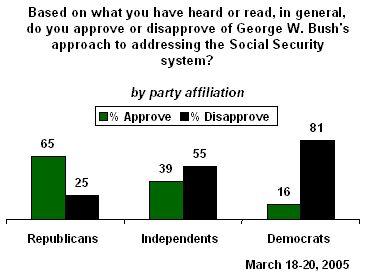GALLUP NEWS SERVICE
PRINCETON, NJ -- President George W. Bush's proposal to restructure Social Security with private investment accounts remains less than popular with the American people. A March 18-20 CNN/USA Today/Gallup poll measured support for the proposal with three different questions, and found the public evenly divided, at best, on the issue.
Republicans are the only partisan group showing majority support for Bush's approach to addressing the long-term fiscal problems with the Social Security system. Democrats are solidly against it, while independents lean toward the Democrats' sentiments.
Most Americans feel fairly well informed about the debate over the future of Social Security. However, self-reported level of knowledge on the issue has little bearing on attitudes about Bush's plan. Those who say they understand the debate "very well" are generally no more supportive or opposed to Bush's plan than those who understand it only "somewhat" well, or not well at all.
"Bush's Approach" to Social Security Sparks Negative Reaction
One measure of support for Bush's plan simply asks respondents whether they "approve or disapprove of George W. Bush's approach to addressing the Social Security system," without providing any specific details of what that approach entails. By a 53% to 40% margin, the current results show net opposition.
These results are similar to the 50% disapproval and 44% approval ratings recorded in early February. The 4-percentage point drop in approval between February and March is within the margin of sampling error for this survey.
Support for Private Investment Limited, but Varies
A second question asks about the concept of private investment accounts, without associating the concept with President Bush, and without mentioning any specific pros and cons. The question simply describes the proposal as one "that would allow workers to invest part of their Social Security taxes in the stock market or in bonds, while the rest of those taxes would remain in the Social Security system."
Americans are divided in their reaction to this question, with 45% favoring the proposal and 47% opposing it. This question was previously asked in December 2004, with similar results.

A third question -- asking Americans whether they think private investment accounts are a good idea or a bad idea -- provides more information about the plan. Most notably, it specifies that the plan is intended to "address concerns with the Social Security system," that it "would allow people who retire in future decades to invest some of their Social Security taxes in the stock market and bonds," and that it "would reduce the guaranteed benefits" of those future retirees.
This wording generates the least support for Bush's plan of the three questions. Only 33% of Americans consider the plan as described a good idea, while 59% call it a bad idea. Support for the idea dropped 7 percentage points since the first week of February.
This is the only question of the three that detects any significant change in attitudes about the proposal in recent months.

How fixed Americans' attitudes are on the issue -- and how influenced they will be by future debate over Bush's plan -- may partially depend on how knowledgeable they are about Social Security reform, and whether that knowledge base changes over time. Already, the public describes itself as fairly well informed. Nearly one-third of Americans (31%) say they understand the current debate over the future of the Social Security system "very well," while another 50% understand it "somewhat well." Only 18% of Americans say they understand it "not too well," or not at all.
Would you say you understand the current debate over the future of the Social Security system very well, somewhat well, not too well, or not at all?
|
|
Very |
Somewhat |
Not |
Not at all |
No |
|
|
|
|
|
|
|
|
2005 Mar 18-20 |
31% |
50 |
13 |
5 |
1 |
For now, there is no correlation between self-described knowledge of the debate and attitudes toward Bush's plan. Those who say they understand the debate very well are similar in their views to those who understand it somewhat well. In both cases, a majority disapproves of Bush's approach to dealing with Social Security.
Those who do not have a good understanding of the debate also disapprove of his approach, though a substantial minority of this group admits they are unsure.

Republican Support Less Than Democratic Opposition
One problem for Bush is that Democrats are more unified in their views of Social Security reform than are Republicans. Just two-thirds of Republicans (65%) approve of Bush's approach, while 81% of Democrats disapprove of it. More than half of independents, 55%, disapprove of Bush's approach, which is almost exactly the average of Republican (25%) and Democrat (81%) disapproval.

Survey Methods
These results are based on telephone interviews with a randomly selected national sample of 909 adults, aged 18 and older, conducted March 18-20, 2005. For results based on this sample, one can say with 95% confidence that the maximum error attributable to sampling and other random effects is ±4 percentage points. For results based on the 443 national adults in the Form A half-sample and 466 national adults in the Form B half-sample, the maximum margins of sampling error are ±5 percentage points.
3. As you may know, one idea to address concerns with the Social Security system would allow people who retire in future decades to invest some of their Social Security taxes in the stock market and bonds, but would reduce the guaranteed benefits they get when they retire. Do you think this is a good idea or a bad idea?
|
Good idea |
Bad idea |
No opinion |
|
|
% |
% |
% |
|
|
2005 Mar 18-20 |
33 |
59 |
8 |
|
|
|
|
|
|
2005 Feb 7-10 |
36 |
60 |
4 |
|
2005 Feb 4-6 |
40 |
55 |
5 |
|
2005 Jan 7-9 |
40 |
55 |
5 |
4. As you may know, a proposal has been made that would allow workers to invest part of their Social Security taxes in the stock market or in bonds, while the rest of those taxes would remain in the Social Security system. Do you favor or oppose this proposal?
|
|
Favor |
Oppose |
No opinion |
|
% |
% |
% |
|
|
2005 Mar 18-20 |
45 |
47 |
8 |
|
|
|
|
|
|
2004 Dec 17-19 |
48 |
48 |
4 |
5. Based on what you have heard or read, in general, do you approve or disapprove of George W. Bush's approach to addressing the Social Security system?
|
Approve |
Disapprove |
No opinion |
|
|
% |
% |
% |
|
|
2005 Mar 18-20 |
40 |
53 |
7 |
|
Form A (Asked Q.3 first) |
39 |
55 |
6 |
|
Form B (Asked Q.4 first) |
42 |
51 |
7 |
|
|
|
||
|
2005 Feb 4-6 |
44 |
50 |
6 |
6. Would you say you understand the current debate over the future of the Social Security system very well, somewhat well, not too well, or not at all?
|
|
Very |
Somewhat |
Not |
Not at all |
No Opinion |
|
|
|
|
|
|
|
|
2005 Mar 18-20 |
31% |
50 |
13 |
5 |
1 |
